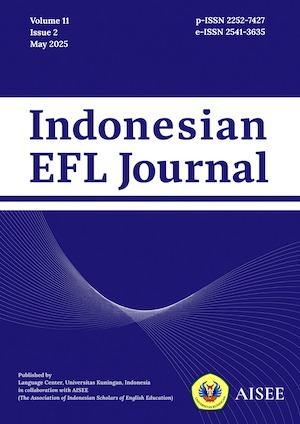METANCOGNITIVE LISTENING STRATEGIES AND MALL: EFFECTS OF LEARNING STYLES AND SELF-EFFICACY
Abstract
This study investigates the impact of metacognitive listening strategies on English listening performance among students at SMK Walisongo Jakarta, particularly in using Mobile-Assisted Language Learning (MALL). Using a purposive sampling method, 68 respondents were selected to participate in this research. The study examines the mediating effects of learning styles and self-efficacy to provide a comprehensive understanding of the interplay between these factors and listening performance. Data were collected through pre-tests, post-tests, and validated questionnaires measuring metacognitive strategy use, learning styles, and self-efficacy levels. The analysis results indicate that learning styles have a significant direct impact on listening performance, suggesting that individual differences in learning styles directly influence their listening abilities. This effect is especially important in the usage of Mobile-Assisted Language Learning (MALL), where students’ learning preferences can affect how effectively they engage with learning materials presented through mobile devices. However, despite this significant direct relationship, the analysis also shows that the indirect effect of learning styles on listening performance through self-efficacy is not statistically significant. This suggests that, although self-efficacy is often considered a mediating factor in the learning process, in this study, it does not play a significant role in influencing the relationship between learning styles and listening performance. The findings offer valuable insights for language educators, emphasizing the importance of tailoring metacognitive strategy instruction to align with learners’ characteristics in technology-enhanced learning environments









